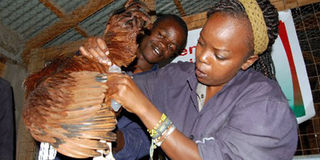Beauty of working as an animal breeder

Sophie Miyumo carrying out an artificial insemination procedure on a chicken at Egerton University, Njoro in Nakuru County. PHOTO|FILE|NATION
What you need to know:
- Animal breeding involves selective mating of livestock (also pets) by applying genetics and related sciences to improve performance on traits of interest.
- You need to have passion for and a genuine interest in improving the lives of animals to become an animal breeder
- Depending on the animal industry you are interested in, a breeder/geneticist can work in any livestock breeding company, organisations involved in the conservation of endangered species, private farms or ranches to oversee breeding management
Sophie Miyumo is an animal geneticist at Egerton University. She spoke to Michael Oriedo what it takes to join the career and why it is crucial in ensuring food security.
What is animal breeding all about?
It involves selective mating of livestock (also pets) by applying genetics and related sciences to improve performance on traits of interest.
Sounds a complicated task, so what is your typical day like?
I engage in data management, studying and analysing pedigrees and genetic analysis of data for evaluation of breeding programmes. Some days involve interaction with the animals (breeding stock) to observe their well-being, behaviour and environment, which helps in the interpretation of the results and in making decisions. This is what I have been doing for the past two years.
What is your advice to a student who wants to take a career in animal breeding and genetics?
You need to have passion for and a genuine interest in improving the lives of animals, even if they are bred for the marketplace. The career can be an exciting choice if you enjoy working with animals and you are particularly detail-oriented. Prospective individuals should have interest in agriculture, biology, statistics and mathematics.
Are there courses at diploma or certificate level in this field of study? What are the entry requirements?
Animal breeding and genetics courses in the country are only offered at Masters level. Entry requirements include Bachelors’ degree in Animal Science or agriculture-related science (second class, honours upper division and above).
Are careers in the animal breeding field well-paying?
Earning varies widely depending on your level of qualification or experience or the institution/organisation (public or private). But yes, you can grow in it.
What challenges do you face in your job?
Currently, the livestock industry is moving into an era of applying molecular genetics in animal breeding but access to facilities for such work is limited making it difficult to achieve some of my objectives since my work revolves around innovative technologies for improved livestock performance
What do you love most in the job?
I love the job because it gives me the opportunity to contribute towards a food-secure Kenya by generating new information through the research work I carry out while at the same time disseminating information through extension work.
Any successes?
I successfully trained and implemented the use of artificial insemination in two commercial hatcheries in the country to enhance the breeding capacity of their flocks.
What are the job openings in this career?
Depending on the animal industry you are interested in, a breeder/geneticist can work in any livestock breeding company, organisations involved in the conservation of endangered species, private farms or ranches to oversee breeding management.
You can also work as a breeding consultant and in animal biotechnology companies. Depending on your qualifications, you may also find positions in academic and research institutions as a lecturer or a researcher in the field. At government level, there are opportunities in managing research programmes, national genetic evaluations and public policy. Non-conventional livestock operations such as Kenya Wildlife Services also offer job opportunities to manage their breeding programmes.





